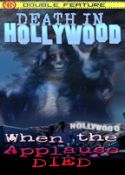
Directed by Nick Bougas
The public has always had a fixation with the stars they see at the movies, and often have trouble distinguishing private and public personas of these larger than life individuals. This was especially the case during the classic years of Hollywood, when the big name actors had more of an iconic quality to them, especially compared to many of the vacant pretties that often pollute our screens nowadays.
If Jude Law or Toby McGuire hung themselves dressed as women, how long would people really be talking about it? Can they even be classed as stars?
Behind the potent glitz and glamour of yesteryear's pinups often lurked some 'sordid' stories. While novelists such as Graham Masterton ('Mirror') and Clive Barker ('Coldheart Canyon') have made provocative and imaginative horror fictions on the subject, reactionaries have been keen to fuel cautionary tales. Two such 'tools' of this trend can be seen in the documentaries on this double feature by SRS cinema - DEATH IN HOLLYWOOD (1990) and WHEN THE APPLAUSE DIED (also 1990).
Needless to say, it's a dull, staid trend that has been given a dull, staid presentation. If the drowning of Nathalie Wood and the death by car crash of James Dean gets you hot and bothered, these films by Nick Bougas will keep viewers dry and flaccid.
DEATH IN HOLLYWOOD spends a chunk of its 87-minute running time exploring the "grim legacy" of REBEL WITHOUT A CAUSE, whose stars James Dean, Nathalie Wood, Sal Mineo and Nick Adams all met grim early ends. What strikes one upon first viewing is the snobbishness of the narrator's words: after a slew of high profile '50s films, Adams was "reduced to" working in a Boris Karloff film, we are told. Why would a distributor of the cheesiest exploitation pap, SRS, be interested in a documentary that seems to frown on anything below the esteemed 'A list'?
Like Adams, Sal Mineo was unable to escape identification with his fine work on REBEL, being typecast until his career was drained of all creativity. After being unable to secure the parts he wanted, such as roles in THE GODFATHER and IN COLD BLOOD, we're told that of all the vices, gambling was his undoing…While Dean's death is legendary, being obsessed over so memorably by JG Ballard's perverse Vaughan in the book and film versions of CRASH, Wood's is still shrouded in secrecy.
The montage/narrator format is wholly inadequate to deal with this 1981 mystery: what we need are interviews with friends, family, and experts on the Wood death. All we get is a few words on the row she had with Christopher Walken that prompted her to depart her husband Robert Wagner's boat at night, leading to her (accidental?) death in a dingy. Unfortunately, as with the rest of this piece of work, we are not told anything particularly new or interesting to earn/rekindle our interest.
Also covered are the likes of Pier Angeli, Dean's woman, who ended up killing herself at the age of 39, George 'Superman' Reeves, and Albert Dekker. Dekker is a refreshing choice of subject, having played the evil Dr Soberin in KISS ME DEADLY (1955) and the absolutely ruthless railroad magnate Harrigan in Peckinpah's THE WILD BUNCH (1969), but again it's a case of 'strictly the facts ma'am' touched up with a tad of sermonism when we hear of his suicide by hanging.
WHEN THE APPLAUSE DIED shares the same format and attitude of DEATH IN HOLLYWOOD, and continues to tell "the shocking stories behind the deaths of the silver screen's most beloved celebrities." Decadence is explicitly spelled out as the root of all trouble, as we learn of the spending, prohibition boozing and the slutty women that ultimately proved the undoing of fatty Arbuckle - culminating in the myth that the 1920's comic squashed a woman to death beneath his immense bulk.
This film has some major structural issues, taking what feels to be the biggest ellipse in film history after the Dawn of Man-to-astronauts transition made in Kubrick's 2001: A SPACE ODYSSEY. No sooner is Fatty out of the way than we hear of John Belushi's tragic crash-and-burn from injected cocktails of heroine and cocaine, in 1982! John, you see, "loved to party." No wonder he's no longer with us.
Like the above film, we are swamped with grubby archive footage and a preachy, overwritten voice over. The subject of child stars - that would inspire Masterton's brilliant and frightening 'Mirror' - is also explored, and we get to hear of the self-destruction of those who were "spoiled and pampered." Yes, it's a very general documentary that gives few satisfying answers or through investigation.
The plight of the 'Our Gang' children, many of whom couldn't adapt to the industry as adults, is given a once over. Carl 'Alfalfa' Switzer is one such example, who struggled after being dropped from the series' cast at the age of 14. Switzer's tragic case is hysterically overwritten: he "fell to the bowels of hellish despair" even ending up in "exploitation movies", and was murdered over a $50 dollar dispute because he couldn't cope 'when the applause died'.
Ah well, at least the title was relevant.
Since 'Our Gang' is looked at, one wishes the film were made 15 years later. Robert Blake, who won a part on the show at the age of 5, made worldwide headlines for the murder of his wife Ronnie Blakely not long ago, but was acquitted due to flimsy evidence. Blake starred in such classics as ELEKTRA GLIDE IN BLUE (1973) and appeared in LOST HIGHWAY (1997). Indeed, his story is one that cult film fans might be interested in, but it's doubtful the makers of this film would make it seem anything less than dull.
Review by Matthew Sanderson
| Released by SRS Cinema |
| Region 1 NTSC |
| Not Rated |
| Extras : see main review |